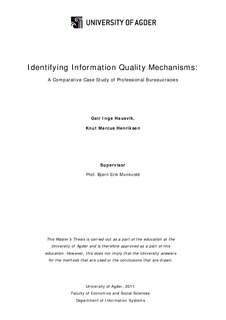| dc.description.abstract | There has been increasing attention to active management of Information quality (IQ) the later
years, due to the severity of the impacts of IQ facing organizations. Still, while large
organizations are typically aware of problems related to information and data, they
consistently underestimate the extent of the problem and are unaware of the potential and
opportunities of IQ management. One reason for difficulties in raising awareness is related to
the complex nature of the concept of IQ; IQ is perceived individually and is context-sensitive.
IQ research the past two decades has been extensive, where the main focus has been on
designing attributes and perspectives in order to assess IQ. Several of these research efforts
have emphasized the need for a deeper understanding of IQ, by using different theoretical
approaches, in order to develop context-specific IQ models.
This thesis aims to identify the underlying mechanisms and the impacts of IQ in a complex
organizational context; professional bureaucracies. This context is particularly interesting,
characterized by difficulties in assessing service quality; quality is hard to assess in general
for the organizations, and particularly for the clients. These characteristics fundamentally
challenge the extant IQ research calling for a consumer-centric viewpoint, based on the
assumption of clients to be the best evaluators of service quality.
Since mechanisms of IQ in professional bureaucracies can be characterized as an emerging
research area, we chose to investigate in two stages; 1) a literature review, and 2) a qualitative
inquiry. Data was collected qualitatively by conducting twelve semi-structured interviews in
two professional bureaucracies; a general hospital and a university. The informants were
representing different parts of the organizations, in order to gain both depth and breadth of the
data.
Our research identifies six distinct underlying mechanisms in professional bureaucracies; 1)
Awareness of IQ, 2) Bureaucratization, 3) Individual contingencies, 4) Locus of power, 5)
Complexity, and 6) Perceptions of IQ. Further, this thesis concludes with four distinct grand
themes of IQ impacts in professional bureaucracies; 1) Client impact, 2) Organizational
impact, 3) Personal impact, and 4) Service impact.
We conclude these mechanisms to be integral parts of IQ in professional bureaucracies by
shaping and affecting the state of IQ. For practice, knowledge of these mechanisms, and the
relating impacts, enables professional bureaucracies to target initiatives aimed at leveraging
IQ. This thesis contributes to research by presenting up-to-date summary of IQ dimensions,
perspectives of IQ and by presenting a context-specific research framework.
Keywords: Information quality, context, mechanisms, impact, professional bureaucracy, case
study | en_US |
